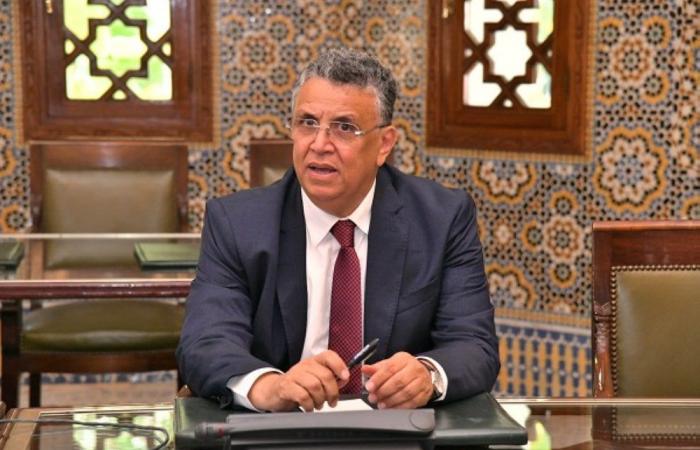In a tense political context, Abdellatif Ouahbi, Minister of Justice and emblematic figure of the Authenticity and Modernity Party, of which he was the general secretary, spoke on June 19, 2024 on the set of the program “Nokta Ila Satr”. His intervention comes in the wake of the presentation of the mid-term report of the Executive by the Head of Government, Aziz Akhannouch, before both Houses of Parliament, an exercise which sparked a wave of harsh criticism from the opposition. Faced with this political tumult, Mr. Ouahbi’s media appearance was awaited with particular interest, promising to shed light on the government’s position and more specifically on the ongoing reforms in the justice sector.
A healthy democratic exercise
“Trees loaded with fruit attract stones,” says Mr. Ouahbi straight away. For the minister, the criticisms raining down on the government are paradoxically a sign of substantial work accomplished. “This presentation of the mid-term report is a positive constitutional practice which makes the government accountable not only to Parliament, but also to the opposition and civil society,” he explains. Far from being offended, Mr. Ouahbi sees these criticisms as an opportunity: “The opposition’s criticism gives value to our work by highlighting the aspects that require improvement.” A posture which contrasts with the often conflicting image of relations between majority and opposition.
If the minister welcomes the exercise of transparency represented by this mid-term assessment, he nonetheless remains lucid about the challenges that persist. “Our political culture still lacks depth,” he laments. Mr. Ouahbi points to the need to strengthen democratic culture in Morocco, welcoming the efforts of his colleague Mehdi Bensaïd, Minister of Culture, despite the numerous criticisms he has received. For Mr. Ouahbi, the stakes are high: it is a question of defending progressive ideas in the face of conservative currents which seek to discredit them. “We must teach our citizens how to conduct democratic dialogue without resorting to unfounded accusations,” he insists, emphasizing the importance of constructive opposition in the democratic process.
The opposition: an essential cog in democracy
Far from rejecting opposition criticism outright, Abdellatif Ouahbi adopts a posture of openness. Referring to the letter from Nabil Benabdallah, leader of Party of Progress and Socialism (PPS), which castigated the government’s record, the minister sees it as a healthy democratic exercise. “I read this letter carefully,” he confides. “Some criticisms are well-founded, others debatable, but it is precisely this debate that strengthens our democracy,” he declared, going in opposition to the posture adopted by the other part of the majority, the National gathering of independents (RNI) whose leaders had seen this letter from the PPS very badly.
This conciliatory attitude does not prevent him from vigorously defending government action. “Our communications strategy is convincing,” he says. “Ministers are required to explain their actions and decisions to the public, whether via social media or in Parliament.” A transparency which, according to him, contributes to strengthening the confidence of citizens in their institutions.
Government majority: between cohesion and tensions
Even within the majority, made up of the PAM, the RNI and the Istiqlal Party, relations are not always smooth sailing. Mr. Ouahbi does not seek to deny it: “In any political coalition, tensions are inevitable.” However, he insists on the coordination and collaboration that prevails between the majority parties. The minister reveals that since leaving his post as secretary general of the PAM, he has voluntarily stayed away from internal party discussions. “I let the new leadership make its own decisions,” he explains, emphasizing his respect for internal party democratic processes.
The challenges of judicial reform
Beyond political games, Abdellatif Ouahbi does not forget his primary mission: the reform of the Moroccan judicial system. He speaks with passion about the many projects underway, from the Penal Code to the Family Code, including the creation of a mediation institution to manage various types of conflicts. “These reforms are essential to modernize our judicial system and improve the efficiency of procedures,” he emphasizes. The minister does not hide his ambition: to draw inspiration from best international practices while adapting them to the Moroccan context. “We want to introduce a culture of mediation into our judicial system, like what is done in France,” he explains.
Mr. Ouahbi is particularly enthusiastic when he addresses the issue of digitalization of the judicial system. “We have already made significant progress,” he rejoices. “The online issuance of criminal records has made it possible to serve a million people without them having to physically travel.” A concrete example of the positive impact of modernization on the daily lives of citizens. For the coming months, the minister is announcing several important bills, particularly concerning the legal professions. “These reforms are crucial to strengthening the professionalization and competence of actors in the judicial system,” he says.
Outlining these prospects for the months to come, the Minister of Justice unveiled a busy legislative agenda, structured around several structuring bills. At the forefront is the overhaul of the Penal Code, a colossal project in the finalization phase and which is on the table of the Head of Government. At the same time, Mr. Ouahbi cited the revision of the Family Code. He also mentioned a series of texts aimed at modernizing the legal professions, with bills concerning notaries, bailiffs and lawyers, which will soon be submitted to Parliament for examination.
Aware of the scale of the task and the challenges awaiting him, the minister announced, not without a certain combativeness, that the next two years will see him assiduously walk the corridors of Parliament. Its objective: to carry out these crucial reforms for the Moroccan judicial system, while preparing for possible political contests. This declaration portends lively debates and intense negotiations in the chamber, reflecting the importance and sensitivity of the issues linked to these reforms.






